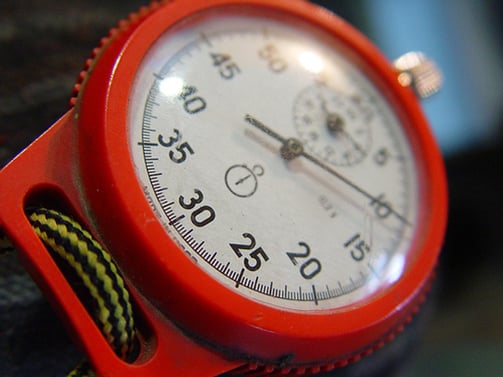How can I use A/B testing on my website?
How do you know which type of ice cream is your favorite? You try all of them and compare the taste. Otherwise, you might stick with coconut crunch...

How many times do you read the words "click here" in a single day? Perhaps dozens.
Overused words and phrases induce blindness in consumers because they become part of the scenery.
It's like the abandoned aluminum can on the corner of your street that nobody bothers to stop and pick up. They don't see it anymore because it's become a fixture in the landscape.
One thing you don't want consumers to overlook is your calls-to-action (CTAs). In fact, you want the exact opposite: an active response. So how do you create compelling CTAs that increase your conversion rates and improve your market share?

You want your prospects to click the button, make the call, or download your white paper.
Therefore, you need to offer something of value in return. ![]()
Writing for Crazy Egg, Peter Boyle suggests that the problem with most CTAs boils down to the meaning behind the language. If your CTA emphasizes the work your prospect must perform, you'll probably sacrifice clicks. People don't like to work harder than necessary -- they're looking for value.
According to Boyle, conversion rates increase dramatically when CTAs use language that emphasizes value. For instance, instead of saying "Buy a new refrigerator," which reminds the prospect of spending money, you could say "Get a great deal on a new refrigerator." You're focusing the language on what the prospect receives rather than what he or she has to do.
Numbers and specificity can add punch to an otherwise lackluster CTA. You're planting a seed in your prospect's mind. If you can provide concrete data or information, you'll have a much stronger card to play. For example, instead of "Get a great deal on a new refrigerator," you might get more response from a CTA like "Get 20% off your next refrigerator."
Why does this make the CTA stronger? Because "great deal" is subjective. Perhaps one prospect thinks $20 off represents excellent savings, while another isn't happy unless the price dips by $200. Furthermore, the second CTA tells the prospect exactly what he or she should expect -- no games or surprises.

A ticking clock can energize consumers faster than any other inbound marketing strategy. ![]()
If your inbound marketing strategy hasn't produced measurable results, your CTA might lack a sense of urgency. According to Neil Patel of Marketing Land, "urgent situations cause us to suspend deliberate thought and to act quickly." You can employ the urgency principle to great effect in your CTAs.
Take a look at our appliance example. You could change it to "Get 20% off your next refrigerator if you act now" or "Take 20% off the price of any new refrigerator through Friday." Now consumers know they need to act quickly or they risk missing out on the deal.
Crafting compelling CTAs takes effort, but you'll appreciate the increased conversion rates that result from your hard work. Of course, there's more to marketing than a slam-dunk CTA. If you're looking for more revolutionary secrets to inbound marketing success, contact us to learn how we make magic happen through strategic marketing campaigns.
And if you'd like to learn more about how you can measure the effectiveness of your marketing efforts, get your free copy of our eGuide: The six marketing metrics your boss actually cares about.
Make sure to connect with us on LinkedIn to get valuable insight on the latest news in marketing and website design. Follow us here:

How do you know which type of ice cream is your favorite? You try all of them and compare the taste. Otherwise, you might stick with coconut crunch...

In an ideal world, every exchange you have with customers and leads will yield a result in one form or another - an addition to your newsletter...

So you're on board with the inbound marketing ethos and it's driving traffic to your site, but so far it hasn't led to higher conversion rates. ...